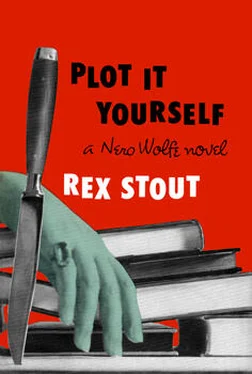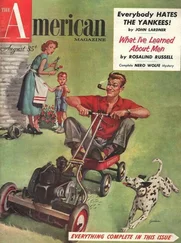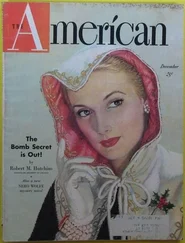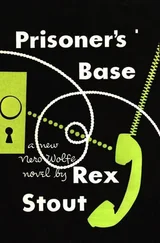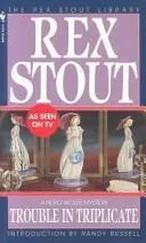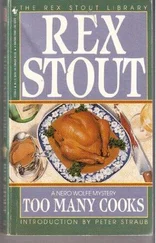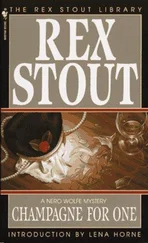“Do you mean you’re quitting?” Dexter asked.
“I mean that it no longer seems to be my kind of job. To do it properly and with expedition at least a dozen competent operatives will be needed, with competent supervision. That will cost six hundred dollars a day or more, plus expenses, seven days a week. I would not supervise such an operation. But I should finish my report. As I told Mr. Harvey on the phone on Saturday, I sent Mr. Goodwin to call on those four people, and he has seen them. Archie?”
I had tossed my notebook over my shoulder onto my desk. It looked as if we weren’t even going to send a bill for expenses, and in that case I was out $3.80 for the fried chicken I had bought at the Green Fence. “Do you want it all?” I asked.
“Not I. They. Miss Ballard is taking notes. If it isn’t too extensive.”
“It isn’t. Two minutes with Simon Jacobs, seven with Kenneth Rennert, one with Jane Ogilvy, and eight with Alice Porter.”
“Then verbatim.”
I obliged. Since I had developed that faculty to a point where I could give Wolfe a full and accurate account of a two-hour conversation with three or four people, this little chore was nothing. As I went along I noticed that Mortimer Oshin was lighting no cigarettes, and I was taking it as a compliment until I realized that, being a dramatist, he was sizing up the dialogue. When I finished he reacted first.
“That Jane Ogilvy speech,” he said. “Of course you’ve dressed it up. Damn good.”
“No dressing,” I told him. “When I report I merely report.”
“And you think Kenneth Rennert is not the — the instigator?” Gerald Knapp asked.
“Right. For the reasons given.”
“It seems to me,” Philip Harvey said, “that this doesn’t alter the situation any. As Mr. Wolfe described it.” His head moved to take them in. “So now what?”
They held a committee meeting. What made it a meeting was that when more than three of them talked at once Harvey yelled that he couldn’t hear anybody. After a quarter of an hour the consensus seemed to be that they were in a pickle, and I was thinking that if I were chairman I would ask for a motion to that effect.
Thomas Dexter raised his voice. “I would like to suggest,” he suggested, “that we take twenty-four hours to consider the matter as it now stands, and meet again tomorrow. It is possible that Mr. Wolfe—”
“Wait a minute,” Oshin cut in. He had a cigarette going. “I’ve got an idea.” He stretched his neck to see around Gerald Knapp, to look at me. “A question for you, Mr. Goodwin. Which one of those four people needs money most?”
“That depends on what you mean by ‘money,’ ” I told him. “A ten-spot or a grand or half a million?”
“Something in between. Here’s my idea, and I like it. We make one of them an offer. Nero Wolfe makes it for us. Say ten thousand dollars. What the hell, I’d be willing to kick in that much myself. My lawyer thinks I may have to pay Rennert between fifty and a hundred thousand, and if this works Rennert will be done. And you’re in the same position, Miss Wynn, with Alice Porter. She’s going to nick you—”
“Not the same,” Reuben Imhof objected. “There’s no evidence. Alice Porter has claimed that Miss Wynn plagiarized a story she wrote, but the story hasn’t been produced.”
“It will be. Miss Wynn, wouldn’t you be willing to pay ten thousand dollars to have Alice Porter stopped? Stopped for good?”
Amy Wynn looked at Imhof. He patted her on the shoulder. “Stopped how?” he asked Oshin. “What’s your idea?”
“Very simple. Brilliant but simple. We offer him, or her, twenty thousand dollars to spill it. Who wrote the story he based his claim on, how the manuscript was planted — everything. With evidence to back it up; that should be easy. We also offer to guarantee that he won’t be prosecuted and he won’t be asked to return his share of the loot. You’ve seen all four of them, Mr. Goodwin. Which one would you pick?”
“Simon Jacobs,” I said.
“Why him?”
“Very simple. Not even brilliant. Rennert is going to collect a lot more than twenty grand from you, or thinks he is. The same goes for Alice Porter; she has just made her claim on Amy Wynn. As for Jane Ogilvy, God only knows. She testified in court that she wrote that story, ‘On Earth but Not in Heaven,’ because ‘she was suffocating under the blanket of her father’s bounty and her mother’s devotion and sought another market for her soul, end of quotation. I suppose meaning that she wanted to get hold of some cash, and presumably this operator knew that and obliged her. When she got it she kicked loose and went to Europe, but in a month she came back to the blanket. She might grab at the twenty grand, or she might spurn it. Just talking about her I use words like ‘spurn.’ ”
“Then that leaves Jacobs.”
“Right. He probably used up his share of the take long ago. He’s having a hard time placing his stories. He’s living in a dump with his wife and children. I don’t know if he’s in debt, but he probably is, and he’s not the kind of guy who would enjoy being in debt. He might open the bag for twenty grand if he had a tight guarantee that he wouldn’t be prosecuted and he wouldn’t be expected to repay what he got from Richard Echols more than two years ago. He hasn’t got it any more. Of course the guarantee would have to come from Echols.”
Oshin went to Thomas Dexter. “How about it, Mr. Dexter? You know Echols; you published his book. Of course I’ve met him, but I don’t know him. Will he go along?”
The publisher passed his hand over his gray hair. “That’s hard to say. I will say this, if Mr. Echols agrees to such an arrangement we at Title House will have no objection. We will concur, provided that Jacobs’ affidavit — I presume it would be in the form of an affidavit — makes it clear that his charge of plagiarism was false. Provided it removes from Title House the stigma of having published a book that was — uh — a fraud. We would engage to make no demand for the return of our contribution to the payment made to Jacobs, or any part of it.”
“That’s fine. But what about Echols?”
“I couldn’t say. He is a reasonable and sensible man in many respects. I think it quite possible that he would — uh — acquiesce, if properly approached.”
“What do you think, Cora?” Philip Harvey asked. “You know him better than anyone here.”
Cora Ballard pursed her lips. “Sure,” she said, “I know Dick. I helped him with his first book contract twenty years ago, before he had an agent. The publisher wanted thirty per cent of the movie rights and twenty per cent of the first serial, and that was ridiculous. Dick’s a little peculiar in some ways, but he likes to do the right thing and he’s very generous. I’ll ask him about this if you want me to, and see what he says. Actually, what he’ll do, he’ll go straight to Paul Norris, his agent, and ask him what he thinks. Of course I know Paul, and it might be better to take it up with him first. I could see him this afternoon.”
“That’s the kind of an executive secretary to have,” Gerald Knapp said. “No wonder you authors always get the best of it.”
Chairman Harvey snorted. “Comic relief. Always welcome. Speaking for myself, if I were Dick Echols I wouldn’t hesitate. Unfortunately I’m not in his class and never will be. I’ve had six books published, and my last one, Why the Gods Laugh , is in its ninth thousand, which is a record for me.” He looked around. “What about Mr. Oshin’s idea? Do we like it?”
“I do,” Oshin said. “Ten thousand dollars’ worth, and I think Miss Wynn should match it.”
Amy Wynn looked at Reuben Imhof. “We’ll discuss it,” he told her, and turned to the chairman. “It certainly won’t do any harm for Miss Ballard to sound out Mr. Echols and his agent. If they agree to cooperate, then we can decide whether to go ahead.”
Читать дальше
